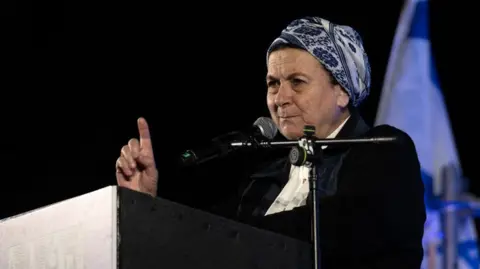In a significant development concerning the Israeli-Palestinian conflict, the United Kingdom has imposed sanctions on Daniella Weiss, a prominent figure in the Israeli settler movement, widely regarded as the “godmother” of this movement. This action reflects the UK government’s commitment to holding extremist settlers accountable amid escalating violence and intimidation against Palestinian communities. Foreign Secretary David Lammy emphasized that these sanctions underscore the UK’s determination to address these troubling issues, marking a notable stance in the ongoing international discourse surrounding Israel’s settlement policies.
Daniella Weiss, now aged 79, leads a radical settler organization known as Nachala — which translates to “homeland.” This organization has also been sanctioned alongside Weiss. For decades, she has played an instrumental role in establishing Jewish settlements in areas of the West Bank and East Jerusalem, territories that were captured by Israel during the 1967 Middle East War. Given her influential position, the sanctions represent a direct measure against individuals considered to be exacerbating tensions in these regions.
The UK’s sanctions targeting Weiss detail her involvement in various aggressive actions against Palestinians, including threatening and perpetrating violence. The Israeli foreign ministry condemned these sanctions as “unjustified and regrettable”, reflecting the Israeli government’s discontent with international scrutiny and pressure regarding settlement activities in contested areas.
Weiss’s notoriety is not confined to political spheres. She gained additional media attention through Louis Theroux’s documentary titled “The Settlers”. Her outspoken views emphasize a belief that Gaza’s Arab populace should relocate, as she argues that the land is more suited for Jewish inhabitants. In her interview with BBC News, she stated, “Gaza Arabs will not stay in the Gaza Strip. Who will stay? Jews,” which exemplifies her controversial perspective regarding demographic changes in the region. Weiss asserted that options exist for relocating Palestinians, specifically highlighting people’s capability to resettle elsewhere, including larger territories abroad.
Following the sanctions, Weiss declared that numerous families were poised to initiate settlement activities in Gaza immediately. Her organization, Nachala, has been vocal about its mission, advocating for what it describes as “conquest, immigration, and settlement” in Gaza. The escalation of such rhetoric raises concerns regarding the potential implications for Palestinian communities and further inflames tensions.
In addition to Weiss, the UK government has sanctioned other figures involved in settlement activities, including Zohar Sabah and Harel David Libi, as well as targeting illegal outposts and organizations associated with these actions. The issue of outposts is particularly contentious, as they are built without formal Israeli government authorization, often intensifying conflicts with Palestinian residents and undermining prospects for a peaceful resolution to the conflict.
Foreign Secretary Lammy urged the Israeli government to take responsibility for curbing such aggressive actions, highlighting that their inaction threatens both Palestinian communities and the viability of the two-state solution. In tandem with these sanctions, the UK government has paused free trade negotiations with Israel, arguing that productive discussions cannot progress under a government that pursues harmful policies in the West Bank and Gaza.
An Israeli spokesperson responded critically to these developments, claiming that the UK government’s actions emerge from an anti-Israel stance that risks harming its own economy. The sanctions follow a joint statement from the leaders of the UK, France, and Canada, who called on Israel to cease military operations and facilitate the entry of humanitarian aid into Gaza.
As the conflict persists, Israel announced it would allow a minimal amount of food into Gaza, effectively ending an eleven-week blockade aimed at pressuring Hamas. However, aid officials, including UN aid chief Tom Fletcher, described this offer as insufficient, characterizing it as a “drop in the ocean” compared to the urgent needs of the Gazan population. The ongoing dialogue and actions taken by the UK government highlight a complex web of political, humanitarian, and ethical considerations in one of the world’s most protracted conflicts.



